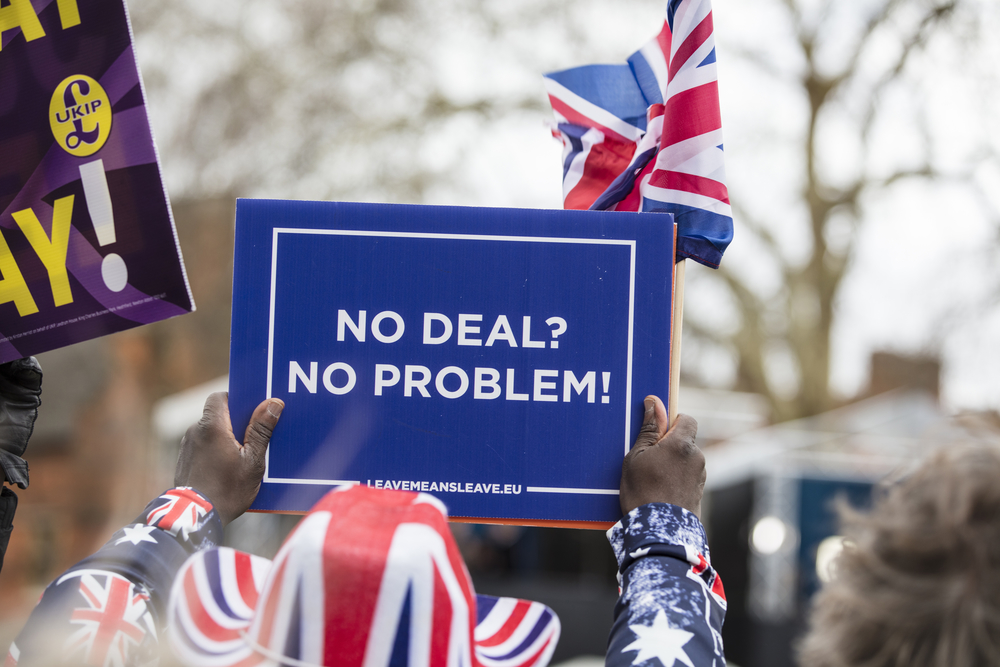Once upon a time, Newt Gingrich could say that Boris Johnson was “Margaret Thatcher with wild hair”. Now that would be difficult to argue.

Matthew Lesh, Head of Research at the Adam Smith Institute, reports on CapX that “the UK could sacrifice a deal with the EU — which would in the short run seriously disrupt trade in goods and services, undermine security service data sharing, and raise serious legal issues around the Northern Ireland Protocol — for the worst possible reason: an interventionist economic agenda.” Lesh adds: “For a supposedly conservative Government that just vanquished Corbynite socialism, that would be quite something.”
Lesh’s article is well worth reading.
As an outsider, I can see that a “No Deal” path would energize Brexiters and thus strengthen the government’s position in the country. It is an expensive way of making your supporters happy: nasty divorces often are. But it may well be that Johnson and his cabinet think the price is worth paying. Yet in politics, you can hardly do stuff claiming that you are doing it only for the sake of pleasing your voters: that would defy their very purpose, as voters themselves want high motives and nice sounding reasons, for you to do stuff which actually pleases them.
The high motive and nice sounding reason the British government worked out is that it should be able to support- with taxpayer money- all the companies it cares for. The Guardian (which is not Reason magazine) perfidiously reminds us that “Margaret Thatcher thought Europe allowed too much of it [state aid], Jeremy Corbyn believed there was not enough”.
On the one hand, then, the fact that the British government thinks the state aid issue is palatable to its voters as an excuse for a “No Deal” Brexit tells us something. Namely, that perhaps our vignette of the Tory voter as by and large more free-market oriented than others does no longer resemble reality. Sure, these voters detest the EU more than anything else, but their leaders’ vocabulary used to imply that the EU ought to be detested because it is bureaucratic and protectionist (do you remember “Global Britain”?), a petty organization that regulates anything which moves. Now should it be detested because it puts a brake on government subsidies…?
On the other hand, it may well be that conservative politicians, on top of believing a “No Deal” Brexit will be good for their popularity, actually believe that England needs more latitude in spending taxpayers money to the benefit of businesses of government’s choosing.
On that, I have little to add to the point Lesh makes:
Forsyth claims the Government is concerned that without subsidies the UK risks becoming “a technological vassal — reliant on either the United States or China, both of whom are unafraid to use the state to shape these markets”.
This is crazy technological isolationism. No single country can or should develop every single technology and keep it for themselves. We are much richer because of technologies developed and produced in other countries. Imagine how awful everything would be if we only used British-made goods no iPhones, no Zoom, no Samsung TVs, no Amazon, no Microsoft Windows. The list is endless. Remember too that the great tech success stories in the US, and even in communist China, are led by the private sector, not the state.
According to [ITV’s journalist Robert] Peston, Dominic Cummings [the main adviser to Boris Johnson] believes that the key to British success in the first industrial revolution was being the first mover in many key industries. Again, though this had little to do with state intervention. In fact, quite the opposite.
The reason Britain was successful during the industrial revolution was a combination of freedom to disrupt existing modes of production and a strong emphasis on entrepreneurship, underpinned by property rights. We should take the same approach today by getting rid of cumbersome red tape and taxes that hold businesses back.
Among contemporary ruling classes, the “technological isolationism” Lesh underlines is going strong. Everybody wants “his” science and “his” technology to be on top of everyone else’s. This is quite bizarre because one would think that if there is one area in which the benefits of international cooperation are clearly apparent is science and research. When a safe and effective vaccine about Covid-19 is happily produced, will you be refusing it, if it does not come out of your national labs?


READER COMMENTS
David King
Sep 11 2020 at 1:37pm
I am a Brexit supporter and also a supporter of more state aid. Hence the interest in your article.
All countries including the US have elected governments. The electorate look to those they elect to safeguard their welfare and livelihoods. One way or the other, when they suffer, the government invariably steps in. Call it state aid if you will.
If the government doesn’t step in and welfare and livelihoods are undermined then there will be consequences. We have seen it in the US with Trump who has managed to set himself up as the unlikely champion of the broken rust belt.
You might or might not agree with Trump or may even question his motives but there’s nothing to suggest that the free market will restore welfare and livelihoods.
Too many parts of the UK are akin to the broken rust belt and facing similar problems. How do you rejuvenate? What is the role of government in this? I’m not sure but I can’t see it happening without government playing a key role. Call it state aid if you will. Pro-business, pro-entrepreneurs but state aid if you will.
Juan Manuel Pérez Porrúa Pérez
Sep 11 2020 at 5:18pm
I had the impression that Brexit was mostly about immigration.
Mark Brady
Sep 11 2020 at 9:17pm
No, Brexit wasn’t “mostly about immigration.” In brief, it was about whether political decision-making should increasingly reside with the European Union or move back to the UK.
From the nineteen-sixties when I was growing up in Britain, I have followed British politics. In the first referendum on June 5, 1975, I voted “No” to the question “Do you think the United Kingdom should stay in the European Community (the Common Market)?” And I have never regretted that decision.
Juan Manuel Pérez Porrúa
Sep 11 2020 at 10:29pm
But didn’t Britain have a kind of special status within the European Union? It at least had a lot of clout within the European Union, and some of the most ambitious policies like the common currency were never implemented there, and some leeway in funding the EU itself?
Mark Brady
Sep 12 2020 at 10:26pm
As an early, but not a founder, member of the EEC (January 1, 1973), the UK was able to negotiate some exceptions from Brussels rule, but in other respects it was increasingly integrated with the rest of the EU.
Shane L
Sep 13 2020 at 3:06pm
The Lord Ashcroft exit poll for the Brexit vote in 2016 found that the percentage voters who thought the following were “a force for ill” was as follows:
– capitalism: 51% Leave voters/49% Remain
– globalisation: 69% Leave voters/31% Remain
– the internet: 71% Leave voters/29% Remain
https://lordashcroftpolls.com/2016/06/how-the-united-kingdom-voted-and-why/
This seems to suggest that a large section of the Leave voters were suspicious of free trade and capitalism during the Brexit vote. There was a right-libertarian vision in some Leave voters, but many wanted to separate from the EU in order to increase government control on society and economy, not liberalise.
Alex
Sep 15 2020 at 10:38am
Interesting article.
Of course the EU isn’t asking for the UK to adopt EU State aid rules now. Instead they want the UK to set up its own robust State aid regime with high standards.
Should the UK set up its own State aid regime so it can coordinate funding from across the 650+ public bodies in UK towards its economic priorities?
Comments are closed.